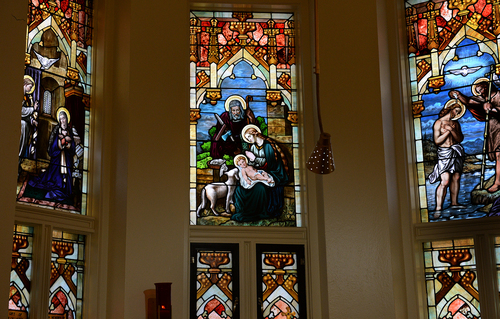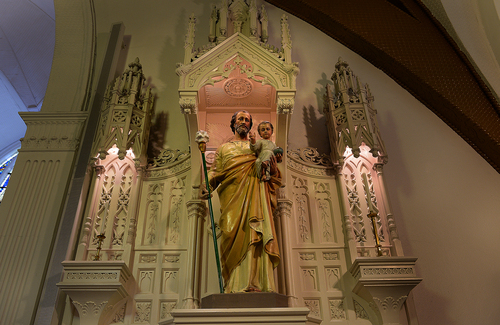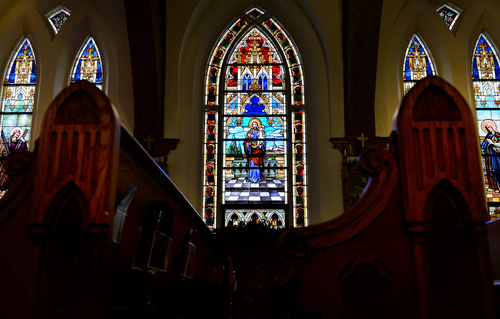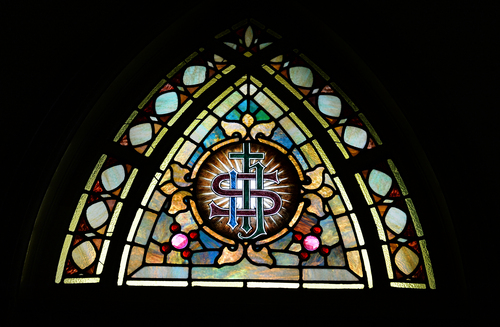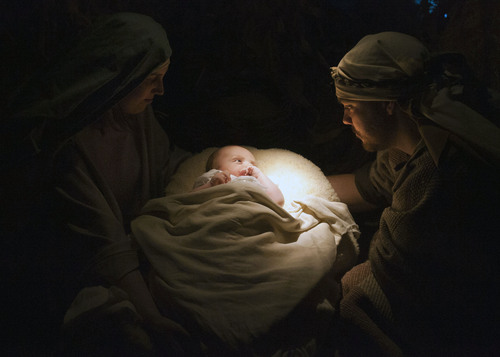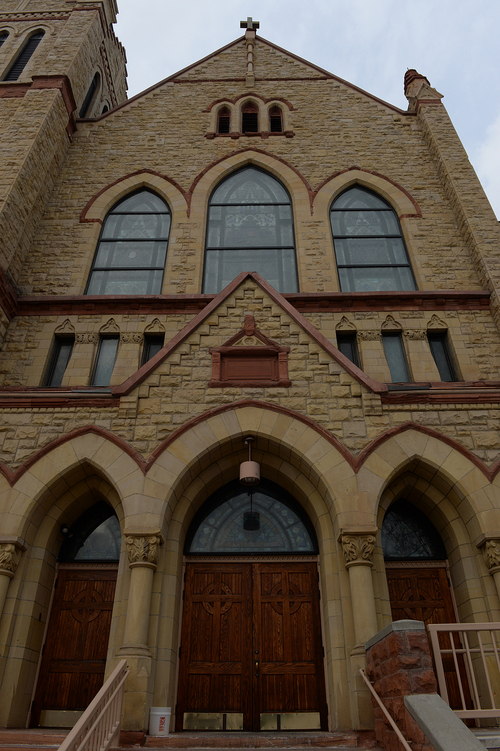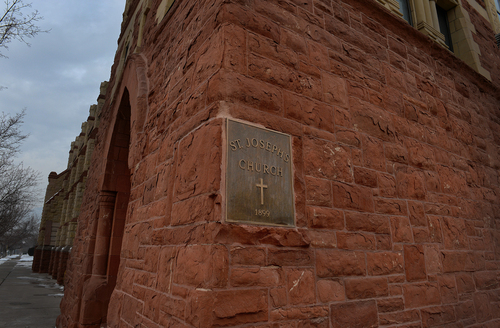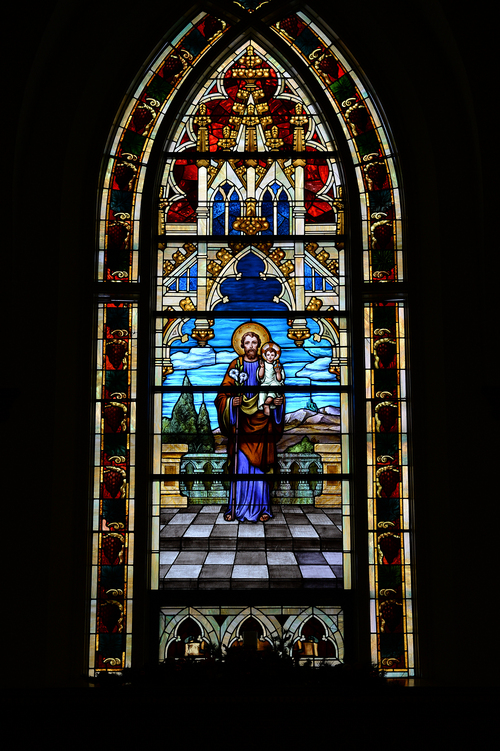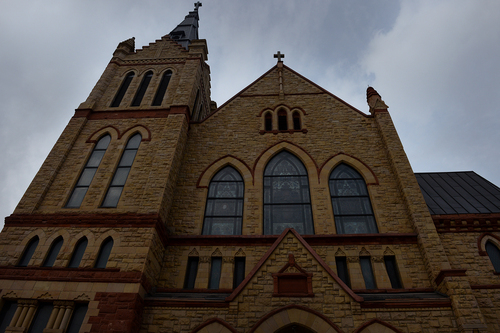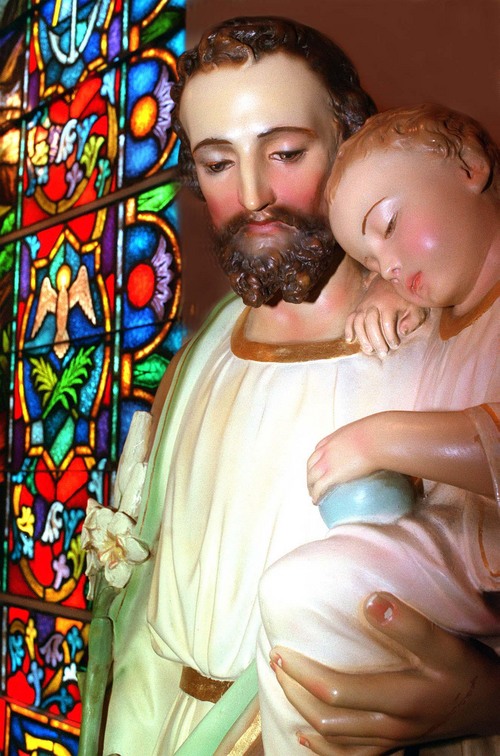This is an archived article that was published on sltrib.com in 2013, and information in the article may be outdated. It is provided only for personal research purposes and may not be reprinted.
Imagine being Joseph, the husband of Mary and stepdad to baby Jesus.
Your fiancée is pregnant and not by you. Her baby is adored by many, who flock for just a glimpse of the newborn son. You are tasked with protecting them both. It is your job to teach a kid — seen as the son of the Almighty who will grow up to be "Redeemer of the world" — how to work, how to pray, how to heed God.
To top it off, you are the only imperfect member of the Holy Family, so when mess-ups happen, guess who gets the blame.
"How do you live in a family where everyone is perfect except you?" asks the Rev. Kenneth Vialpando, pastor at St. Joseph Catholic Church in Ogden.
It took a lot of humility, Vialpando says with a dash of humor, for Joseph to live with his wife, Mary, who was "full of grace," and with Jesus, who was sinless. "He had to take responsibility [for everything that went wrong in the marriage or in the household] because, of course, it couldn't be Mary's fault or Jesus' fault — God forbid."
Joseph's quiet heroism often goes overlooked in the Christmas story and many Nativity scenes, where he is upstaged by kings, angels, shepherds, sometimes cattle. He doesn't even make it into most paintings of mother and child.
Yet there is something profound and compelling in Joseph, who has become a patron saint to Catholic stepfathers and a role model for all Christian dads.
"In a real sense, none of our children are our own," New Testament Mormon scholar Eric Huntsman writes in "Good Tidings of Great Joy: An Advent Celebration of Christ's Birth." "Priceless spirit children of heavenly parents, all children on this Earth are only here on loan from a loving God who trusts us all — parents, grandparents, family, friends, even strangers — to protect, care for, teach, and love them."
Joseph, then, looms as the prototypical father figure, one who plays a unique role in Christian scripture.
And it all started with some, uh, inconceivable news.
—
The journey • Not long after they became engaged, Mary tells Joseph, so the Bible says, that she is pregnant but has not had sex with any man.
"The shock could have sent him running off in the opposite direction out of fear of his own life and out of fear of bringing shame to his wife," Vialpando says. "Yet he was very humble and obedient to the message of the angel who said, 'Joseph, son of David, do not be afraid to take Mary, your wife, into your home.'"
It was his faith that "enabled him to stand by Mary's side every step of the way," the priest says, "even when he couldn't see the whole picture."
Later, the Good Book continues, Joseph had another angelic visitor, who warned him in a dream of impending danger from Herod's troops. So he took wife and child and fled to Egypt. After some years in that foreign land, the family returned to Nazareth to rear the boy who someday would stump religious authorities, perform miracles, preach powerful sermons and die on a cross.
And, Christians believe, return from the dead.
Some apocryphal accounts have Joseph living to old age, but he exits the biblical text after a 12-year-old Jesus is found speaking in the temple — a time when the boy starkly reminds his earthly parents whose son he is.
Unlike many Christians, Catholics believe Mary remained a virgin throughout her life, making her husband chaste by default.
"Joseph himself had to live a life of chastity and celibacy within his marriage to Mary, and therefore he is known as St. Joseph, the Most Chaste Spouse of Mary," Vialpando says. "He must have been the most patient person of all."
The Bible mentions that Jesus had brothers, so some traditions depict Joseph as an older man, who might have become a widower with children.
Whether young or old, Joseph made sacrifices that every father — biological, adopted, foster or step — sometimes faces.
—
Relating to a saint • For Tony Hanebrink, a longtime member of Ogden's St. Joseph parish, the key to being a good stepfather is to love the child's mother.
Hanebrink had never been married 20 years ago when he wed Diane, a divorced mother of two boys, 10 and 6.
"I had this absolutely wonderful wife who loved the boys and she loved me," Hanebrink says now. "My love for them grew relatively quickly. They were good kids then and are good men now — it's easy to love them."
The stepdad "wasn't there when these boys were conceived," he says, "but they are my boys."
That's how Joseph likely felt.
"He loved this woman very much," Hanebrink says. "He protects her, believes in her and makes the best of the situation."
There was probably gossip about Mary around the town well and many likely thought he was a fool, Hanebrink says, but Joseph assured his betrothed, "We'll get through this."
Getting through the tough times is what marriage is all about, says Deacon George Reade of St. Ambrose Catholic Parish in Salt Lake City.
Reade, a divorced dad with two children of his own, was not a Catholic when he met his wife, Mary, who had two adult daughters. He converted to Catholicism shortly before they married, and his new family helped nurture his new faith.
Reade had "a rich love for their mother," he says, "a love that progresses and grows would have to include a growing relationship and love for her children."
Most men in Joseph's situation wouldn't go through with the marriage, Reade says, "but if you do it, you get so much more back."
Indeed, he says, Joseph clearly "got so much out of answering that calling."
He got to be the stepdad to a Savior.
—
Unexpected love • The Rev. Steve Klemz, pastor at Salt Lake City's Zion Evangelical Lutheran Church and a divorced father of two daughters, feels inexorably drawn to the stepdad in Bethlehem.
Klemz married Norma Gonzalez in 2001 and soon adopted her two children, Tiffany and Abel. After high school, Tiffany left home, was involved in a romantic relationship and then returned, pregnant. She was living with the pastor and his wife when she gave birth to Micah Steven Klemz.
That's when Joseph's story began to be especially meaningful to Klemz.
"He's standing by his betrothed. He's traveling with her. He's willing to be uprooted," the pastor says. "What he shows me is what you do when love comes into your life."
Klemz was there for his grandchild's birth. The first time he held the baby, he was overcome with emotion.
"That's what love does," he says.
A child — any child — leads you into a future you hadn't planned. Parenthood takes enormous faith — just like Joseph's.
Legally, Joseph could have rejected his pregnant fiancée. He could have held her up to scorn, ridicule and possibly even stoning.
That would have been an acceptable response in that culture, explains Huntsman, professor of ancient scripture at LDS Church-owned Brigham Young University. Female virginity in that context was closely guarded as important to inheritance and property.
"There are few examples in ancient text," he says, "of someone who knowingly raised someone else's child."
The scholar also mentions that fathers in that culture were the dominant figures in a family, not inclined to bend to a woman's needs.
Joseph presents a different model, Huntsman says. "Instead of ruling or presiding, he is serving, caring and nurturing, putting aside his own needs for those of his wife and baby."
Given Joseph's genealogy as listed in Matthew's Gospel, he was "clearly set up as a scion of a royal family," he says. "You would expect him to be a prince, but he is a carpenter."
Joseph's naming of the child, as described in the biblical account, is seen as a legal act of accepting Jesus as his own son and agreeing to raise and protect him.
Mary's husband was a model of strength and forbearance, of power through gentleness, of forgiveness and humility that the young Jesus would emulate. He also didn't seek recognition for his kindness, Huntsman says. He did all that God asked of him, then he disappeared from the story without fanfare.
For Vialpando, the Ogden priest, Joseph's role is central to the Christmas story, which Christians celebrate next week.
The man who found room in a stable where his wife could give birth "can teach us that we too must enter into Bethlehem and allow Bethlehem to enter into us," Vialpando says, "by recognizing and believing that this whole season is not about consumerism and materialism."
It's about Jesus — and about the good mother and father who reared him.
Twitter: @religiongal


